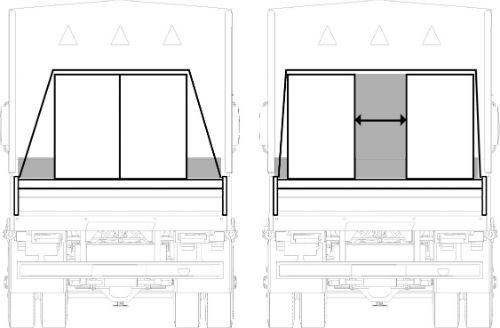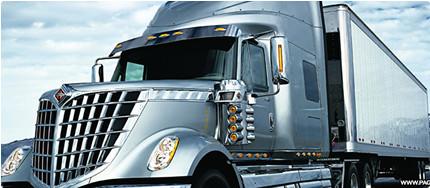Review Questions - Click On The Picture To Begin...

- 4
- 2
- 1
- 3
Quote From The CDL Manual:
-
If load is 5ft or shorter, 1,100 lbs or lighter:
Minimum number of tiedowns: 1
-
If load is 5ft or shorter, over 1,100 lbs:
Minimum number of tiedowns: 2
-
If load is more than 5ft but less than 10ft:
Minimum number of tiedowns: 2
- 1 tiedown for every 10 ft, or part thereof.
- 1 tiedown for every 15 ft, or part thereof.
- 1 tiedown for every 5 ft, or part thereof.
- 2 tiedowns for every 10 ft, or part thereof.
Quote From The CDL Manual:
When cargo is prevented from forward movement (for example, by the headboard, bulkhead, other cargo, or tiedown), secure the cargo according to the following requirements:

All Cargo:
1 tiedown for every 10 ft, or part thereof.
- A platform or tray on which cargo is placed so that it can be handled as an article. (Same as "Skid")
- A device placed between the deck of a vehicle and car or between articles of cargo, intended to provide greater friction than exists naturally between these surfaces.
- A strip of material that may be used to unitize articles and is tensioned and clamped or crimped back upon itself. (same as "Strapping")
- A rail along the side of a vehicle that protects the side of the vehicle from impacts.
Quote From The CDL Manual:
Rub Rail:
A rail along the side of a vehicle that protects the side of the vehicle from impacts.
- Fill the empty space between with other cargo.
- Use some kind of blocking to prevent shifting.
- Make sure it is leaning forward.
- Place them in direct contact with each other.
Quote From The CDL Manual:
For articles of cargo placed beside each other and secured by side-to-side tiedowns:

Either place them in direct contact with each other,
Or prevent them from shifting towards each other in transit by using blocking or filling the space with other cargo.
- The acceleration due to gravity, 9.823 m/sec2 (32.2 ft/sec2).
- The number of hours that a tiedown can be used.
- The summation of the working load limits or restraining capacity of all devices used to secure an article on a vehicle.
- The maximum load that may be applied to a component of a cargo securement system during normal service, usually assigned by the manufacturer of the component.
Quote From The CDL Manual:
Working Load Limit (WLL):
The maximum load that may be applied to a component of a cargo securement system during normal service, usually assigned by the manufacturer of the component.







 Related Cargo Securement Terms That Every Driver Should Know:
Related Cargo Securement Terms That Every Driver Should Know: 



 TT On Facebook
TT On Facebook